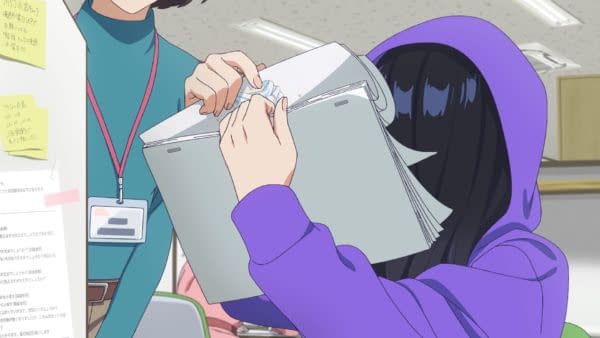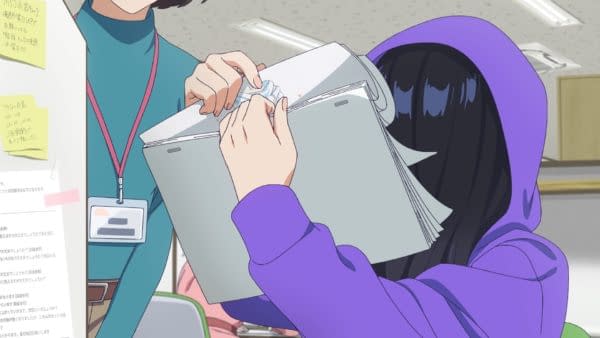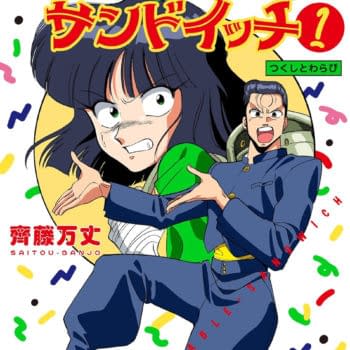Posted in: Crunchyroll, Review, TV | Tagged: anime, Zenshu
Zenshu Eps. 4 & 5: Animator's Isekai Journey Gets Even More Personal
Zenshu Episodes 4 and 5 continue the burned-out animator heroine's isekai fantasy as the "personal journey" part moves further to the front.
Zenshu continues to be, secretly, the best new anime series of the season. It's a satire with a real point of view instead of the usual power fantasy isekai. It's a satire on the anime industry, the isekai genre itself, a homage to the history of anime and its evolution over the decades, and a social commentary on fandom, being an artist, and Millennial burnout. Its heroine, Natsuko, the egomaniacal loner animation director, is really on a journey of self-discovery in the world of her favorite anime movie. Natsuko is the ultimate geek, nursing a love for a cult anime movie, "A Tale of Perishing," a bomb because it was sort of broken and incomplete and had an utterly tragic ending. It speaks to every geek that there's a piece of broken and unpopular pop culture they love, no matter how much it's hated and misunderstood by the mainstream public.

From Goofy…
In episode four, Natsuko gets to change the outcome and destiny of a major character again. Aloof elf Memelm turned out to be one of the final big bads that hero Luck Braveheart had to slay in the movie after she was a trusted comrade by his side throughout the original movie. She turns out to be the ringleader of a death cult trying to bring about the end of the world because her long life as an elf has driven her to a nihilistic despair that makes her want to end everything. How does Natsuko "zenshu" this with her magical animator director power? Why, by creating a life-affirming tuxedoed singing idol hero with fabulous hair to bring joy and romance to Memelm and her fellow cultists, of course. Natsuko saves the world this time by teaching a cult of depressed people how to become geeks who stan an idol! That's hilarious in itself in a minor procedural episode before things start to get real in episode five, where the mystery of Natsuko's own burnout and despair starts to unravel, which hints at why she's ended up in this isekai and where the arc of the series might be heading.
…To "Uh-Oh"
Episode five starts with a flashback to Natsuko before she keeled over at her desk from bad clams in a bento box. She's a burned-out husk of her former self after her debut series as a director put her on the map, and Second Album Syndrome is a threat hanging over her head, especially when she's been saddled with directing a pure love story that she has no real feel for or interest in. As a result, she's behind deadline and over budget, and the animation studio's future hangs in the balance. She terrorises her staff, including a female assistant whom she forces to draw sketches to show what it's like to fall in love. She's so intimidating that the series leans into her "Evil Sadako from The Ring" vibe and hilarious visual reference again, not once but several times in this episode. One of the staff worries that the studio is going to bomb and go the way of "A Tale of Perishing" all over again, which might be a hint for why Natsuko ends up in that world.
The Multiple Meanings of "Zenshu"
"Zenshu" seems to be the Japanese term for "last week," but it also seems to be slang for "fix it all!" That's what Natsuko's whole control freak-loner personality is about. She refused to let any of her staff design or draw the animation frames for her delayed romance anime project. She insists on fixing everything herself. Natsuko is a symbol for millennial burnout, kids burn early this century with high expectations who have hit a ceiling mentally, emotionally and creatively. This entire series is a journey to pull her out of that slump. That's a lot to start delving into for episode five, where things start to get real.
When we rejoin Natsuko and co. in the Perishing world, Natsuko is pretty high on her own supply since she's been the one whose magical animation director powers have saved the world several times now. She hasn't learned anything and thinks she's unbeatable as she and Luke catch up with Princess Destiny, now buff like a WWF wrestler who wants their help going into the slums to help convince the street orphans there to come live in her orphanage where they'll be fed and cared for. Entertaining kids and getting them on the side is literally child's play for Natsuko since she's not only an artist and creator of the type of cartoon drawings they love, but she's a big kid herself, drawing them in with Super Sentai hero poses and catchphrases.
That's another win for her, which makes her even more insufferable than ever, which means she's seriously heading for a fall. She comes across Justice, a fallen member of Luke's band of heroes now reduced to a homeless drunk in the slums. Only she and Justice know the truth behind his fall in the battle that cost another hero his life and alienated him from Luke. Luke is still estranged from Justice, which makes him jealous when Natsuko offers Justice comfort. The fact that Justice is a sexy dragon is totally a coincidence for female geek dragon f*cker stans everywhere. Luke's crush on Natsuko and her platonic affection and pity for sexy dragon Justice might portent Natsuko's journey to discover what it's like to fall in love. She's a messy, egomaniac control freak and asshole, and we're here for it.
Then most void monsters invade and Natsuko makes the mistake of thinking she's got this, and she's going to fix this all on her own. She animates a super samurai in Zenshu's homage to the samurai genre. But that's not enough. Her weapon called for her to animate new fates, not a new fighter. Someone knows she's about to fall. Then her animated hero gets defeated, and she can't draw another solution fast enough for another void monster to come along and lunge right at her in a cliffhanger ending.
Another Superior English Dub
Zenshu is one of a growing list of anime series whose English dub is superior to the Japanese. Don't get me wrong, the Japanese dubs are as good as ever, but having great voice acting in the English dubs has elevated the drama and comedy of several series, such as Demon Lord 2099, Solo Leveling, and now this. The shifting emotional tones of an English-speaking voice coupled with good English dialogue adds extra nuance to the story beyond just translating the lines to another language. The English version of Zenshu is entirely Madeleine Morris' show – she may have the snarkiest voice in all of English language anime now, and her different pitches and comic timing make Zenshu much funnier than the original Japanese version, especially when she snarks and squees with the most online memes and latest fandom slang. The English dub makes Zenshu a more universal allegory for millennial burnout and a celebration of fandom as self-care.
Zenshu is streaming on Crunchyroll.















